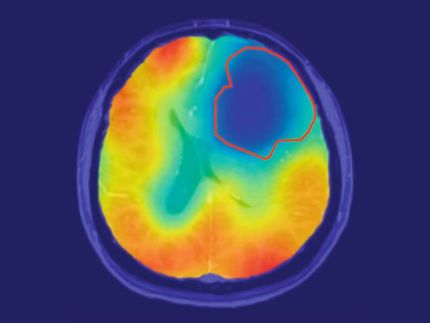AI with infrared imaging enables precise colon cancer diagnostics
Artificial intelligence and infrared imaging automatically classify tumours and are faster than previous methods
The immense progress in the field of therapy options over the past years has significantly improved the chances of cure for patients with colon cancer. However, these new approaches, such as immunotherapies, require precise diagnosis so that they can be specifically tailored to the individual. Researchers at the Centre for Protein Diagnostics PRODI at Ruhr University Bochum, Germany, are using artificial intelligence in combination with infrared imaging to optimally tailor colon cancer therapy to individual patients. The label-free and automatable method can complement existing pathological analyses. The team led by Professor Klaus Gerwert reports in the “European Journal of Cancer” in January 2023.

Klaus Gerwert, Stephanie Schörner and Frederik Großerüschkamp (from left) want to use artificial intelligence to improve the diagnosis of colon cancer.
© RUB, Marquard
Deep insights into human tissue within one hour
The PRODI team has been developing a new digital imaging method over the last years: the so-called label-free infrared (IR) imaging measures the genomic and proteomic composition of the examined tissue, i.e. provides molecular information based on the infrared spectra. This information is decoded with the help of artificial intelligence and displayed as false-colour images. To do this, the researchers use image analysis methods from the field of deep learning.
In cooperation with clinical partners, the PRODI team was able to show that the use of deep neural networks makes it possible to reliably determine the so-called microsatellite status, a prognostically and therapeutically relevant parameter, in colon cancer. In this process, the tissue sample goes through a standardised, user-independent, automated process and enables a spatially resolved differential classification of the tumour within one hour.
Indication of the effectiveness of therapies
In classical diagnostics, microsatellite status is determined either by complex immunostaining of various proteins or by DNA analysis. “15 to 20 per cent of colon cancer patients show microsatellite instability in the tumour tissue,” says Professor Andrea Tannapfel, head of the Institute of Pathology at Ruhr University. “This instability is a positive biomarker indicating that immunotherapy will be effective.”
With the ever-improving therapy options, the fast and uncomplicated determination of such biomarkers is also becoming more and more important. Based on IR microscopic data, neuronal networks were modified, optimised, and trained at PRODI to establish label-free diagnostics. Unlike immunostaining, this approach does not require dyes and is significantly faster than DNA analysis. “We were able to show that the accuracy of IR imaging for determining microsatellite status comes close to the most common method used in the clinic, immunostaining,” says PhD student Stephanie Schörner. “Through constant further development and optimisation of the method, we expect a further increase in accuracy,” adds Dr. Frederik Großerüschkamp.
Original publication
Other news from the department science

Get the analytics and lab tech industry in your inbox
By submitting this form you agree that LUMITOS AG will send you the newsletter(s) selected above by email. Your data will not be passed on to third parties. Your data will be stored and processed in accordance with our data protection regulations. LUMITOS may contact you by email for the purpose of advertising or market and opinion surveys. You can revoke your consent at any time without giving reasons to LUMITOS AG, Ernst-Augustin-Str. 2, 12489 Berlin, Germany or by e-mail at revoke@lumitos.com with effect for the future. In addition, each email contains a link to unsubscribe from the corresponding newsletter.























































